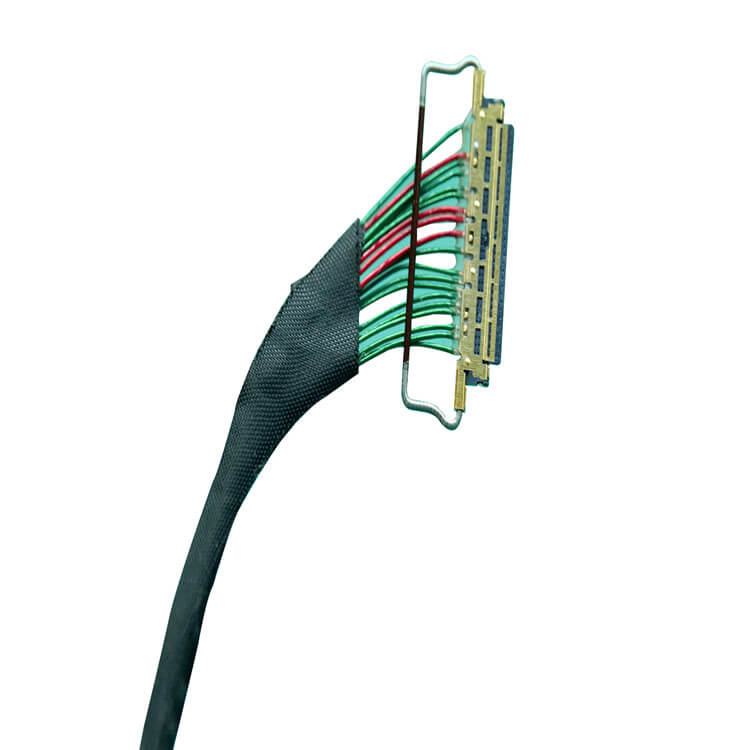In the ever-evolving landscape of technological advancements, the demand for more reliable and durable electronic components is constantly on the rise. Among these, micro-coaxial cables play a crucial role in various industries, from telecommunications and consumer electronics to aerospace and automotive. In recent years, a significant breakthrough has been made with the development of new polymer compounds, which have proven to greatly enhance the durability of micro-coaxial cables.
Micro-coaxial cables are designed to transmit high-frequency electrical signals with minimal loss and interference. Their compact size and excellent performance make them indispensable in modern devices where space is at a premium and signal integrity is critical. However, traditional micro-coaxial cables often face challenges in terms of durability, such as susceptibility to mechanical damage, degradation under extreme temperatures, and vulnerability to chemical corrosion. These issues can lead to signal disruptions, reduced lifespan, and ultimately, higher maintenance and replacement costs.
This is where new polymer compounds come into play. Scientists and engineers have been working tirelessly to develop polymers with enhanced properties specifically tailored to the needs of micro-coaxial cables. These new compounds offer a wide range of benefits that significantly improve the overall durability of the cables.

One of the key advantages of the new polymer compounds is their superior mechanical strength. By incorporating advanced materials and innovative manufacturing techniques, these polymers can withstand greater levels of stress, strain, and impact. For example, some polymers are reinforced with nanomaterials, such as carbon nanotubes or graphene, which provide exceptional tensile strength and flexibility. This means that micro-coaxial cables made with these polymers are less likely to break or become damaged during installation, handling, or normal use. Whether it’s in a high-vibration environment like an aircraft engine or a frequently flexed application in a wearable device, the cables can maintain their structural integrity and continue to function optimally.
In addition to mechanical strength, new polymer compounds also offer excellent thermal stability. Many modern electronic devices generate a significant amount of heat during operation, and micro-coaxial cables need to be able to withstand these elevated temperatures without degrading. The new polymers are engineered to have high melting points and low coefficients of thermal expansion. This allows them to maintain their physical and electrical properties even in extreme heat conditions, preventing issues such as insulation breakdown, conductor deformation, and signal degradation. In applications like data centers, where large numbers of cables are packed closely together and heat management is a major concern, the use of these heat-resistant polymers can greatly improve the reliability and lifespan of the micro-coaxial cables.
Chemical resistance is another important aspect enhanced by the new polymer compounds. Micro-coaxial cables are often exposed to various chemicals, including solvents, oils, and cleaning agents. Traditional polymers may be prone to chemical attack, which can lead to swelling, cracking, and loss of performance. The new polymers, on the other hand, are formulated to resist chemical degradation. They can withstand exposure to a wide range of chemicals without significant changes in their properties, ensuring that the cables remain functional and reliable in harsh chemical environments. This is particularly important in industries such as automotive manufacturing, where cables are exposed to engine oils, fuels, and other chemicals, and in the medical field, where cables need to be sterilized regularly using chemical agents.
The impact of these new polymer compounds on the durability of micro-coaxial cables is already being felt in various industries. In the telecommunications industry, for example, network operators are able to install micro-coaxial cables with greater confidence, knowing that they will last longer and require less frequent maintenance. This not only reduces operational costs but also improves the quality and reliability of communication services. In the consumer electronics market, manufacturers can design smaller, more compact devices with micro-coaxial cables that are more resistant to wear and tear, enhancing the overall user experience and reducing product returns due to cable-related issues.
Moreover, the aerospace and defense sectors stand to benefit significantly from the enhanced durability of micro-coaxial cables. In aircraft and military equipment, where reliability is of utmost importance, the use of cables made with new polymer compounds can reduce the risk of system failures caused by cable degradation. This can lead to improved mission success rates, increased safety, and lower life-cycle costs.
Looking ahead, the development of new polymer compounds for micro-coaxial cables is an ongoing process. Researchers are constantly exploring new materials and processing techniques to further enhance the properties of these polymers. As technology continues to advance and the demand for smaller, faster, and more reliable electronic devices grows, the role of new polymer compounds in improving the durability of micro-coaxial cables will become even more crucial.
In conclusion, the advent of new polymer compounds represents a significant leap forward in the field of micro-coaxial cable technology. By enhancing the mechanical strength, thermal stability, and chemical resistance of the cables, these compounds are ensuring that micro-coaxial cables can meet the demanding requirements of modern applications. Whether it’s in telecommunications, consumer electronics, aerospace, or any other industry that relies on these cables, the improved durability offered by new polymer compounds is set to drive innovation, reduce costs, and enhance overall performance.
Our factory offers high-quality products at competitive prices
IntroductionIn today’s fast-paced digital world, reliable and high-speed data transmission is critical for industries ranging from telecommunications to aerospace. Enter High-Speed Data Micro-Coax—a cutting-edge miniature coaxial cable e.
Meta Description: Discover the advanced features and benefits of Industrial Micro-Coaxial Wiring—engineered for precision, durability, and high-speed signal transmission in industrial environments. What is Industrial Micro-Co.
Feel free to reach out to us for any inquiries or orders